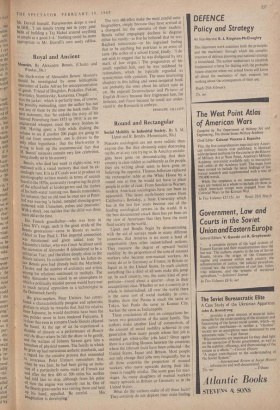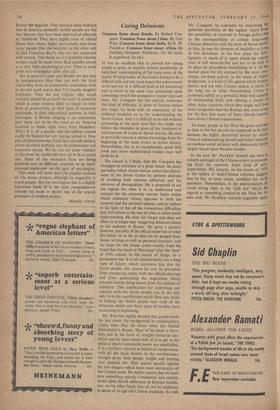Round and Rectangular
Social Mobility in Industrial Society. By S. M. Lipset and R. Bendix. (Heinemann, 30s.) PERHAPS sociologists are not more sadistic than anyone else. But they obviously enjoy destroying myths, or at any rate trying to. In America sociolo- gists have gone on demonstrating that their country is class-ridden as stubbornly as the people they are writing about seem to have gone on believing the opposite. Thomas Jefferson.replaced the rectangular table at the White House by a round one so that he would not have to place people in order of rank. From Sorokin to Warner. modern American sociologists have not been as squeamish. This latest myth-buster comes from California's Berkeley, a State University which has in the last few years become one of the leading sociological centres in the world. It is the best documented attack there has yet been on the view of Americans that they have the most fluid society in the world.
Lipset and Bendix begin by demonstrating, with the aid of surveys made in many different countries, that America is no more a land of opportunity than other industrialised nations. They measure the degree of upward 'social mobility' by the proportion of the sons of manual workers who become non-manual workers. As many do so in Germany or France, in Britain or Japan as in the United States. In each country something like a third of all sons make this jump up. In each country, too, the same kind of pro- portions—round about a quarter—drop in their occupational class. Whether or not a country as a whole is industrialised, all over the world there is the same sort of social mobility in cities. Studies show that Poona is much the same as Tokyo, Sao Paulo the same as Kansas City, Aarhus the same as Indianapolis.
These conclusions all rest on comparisons be- tween two generations of the same family. The authors make another kind of comparison, of the amount of social mobility achieved in one generation. How many people whose first job is manual get white-collar jobs later? Once again there is a startling likeness between the countries where the relevant facts have been collected—the United States, Japan and Britain. Most people not only change their jobs very frequently, but in all three countries the proportion of manual workers who move upwards during their life- times is roughly similar. The same goes for mar- riages. As many daughters of manual workers marry upwards in Britain or Germany as in the United States.
What do the authors make of all these facts?. They certainly do not deplore their main finding. Rather the opposite. They produce some evidence that in America upwardly mobile people are like that because they have been deprived of affection in childhood. They have higher rates of mental illness than others, higher particularly than those lucky people (like the beatniks on the other side of San Francisco Bay?) who are not concerned with success. This being so, it is doubtful whether society could be made more fluid socially except at a very high psychological cost. There is some point in a rectangular table after all.
But in general Lipset and Bendix are less sure in interpretation than they are with the facts which they have so competently assembled, both in the text itself and in their 314 (mostly lengthy) footnotes. They do not explain why social mobility should be so much the same in countries which in other respects differ so much—in their level of productivity, in their rates of economic expansion, in their educational systems, in their ideologies. A Britain clinging to an aristocratic past turns out to be the same as an America resolved to break right away from feudalism. Why? It is all a puzzle, and the authors cannot really be blamed for not having solved it. Des- pite all these footnotes, fresh facts are still needed, above all about mobility into the professional and executive classes. We do not yet know whether at this level the world will turn out to be so much one. Some of the necessary facts are being gathered now in different countries in an inter- national endeavour on the part of sociologists.
This study will never have the popular acclaim of The Status Seekers, although, its originality is much greater. But for sociologists this is a highly important book. It is the most comprehensive attempt yet made to record one of the crucial processes of modernsociety.
MICHAEL YOUNG







































 Previous page
Previous page